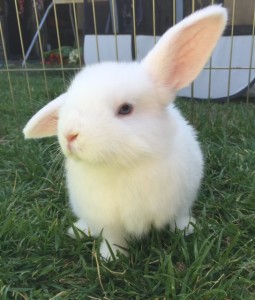Rabbits are often purchased as impulse pets or gifts for children. Sometimes, after people realize that a rabbit requires the same commitment as a dog or cat, they question their decision. There may also be times a beloved family pet has to be given up due to a drastic change in circumstances in the home. If you have changed your mind about your rabbit, we urge you to speak to us or read our information about rabbit behavior. Did you know that spaying and neutering helps to decrease negative behaviors associated with sexual maturity (including digging and chewing)? Often, people don’t realize that a “destructive”, “messy” or “aggressive” bunny can become a perfect bunny with a little help from its humans. You may be surprised to find out how easy it is to litter train your rabbit and bunny-proof your home, making it easier to have your rabbit out of the pen or cage, socializing with you. The more time you spend with your rabbit out of its pen or cage, the more you will realize it has a unique personality of its own. If you have determined that you really must find a new home for your rabbit, we urge you to consider the following:
Many people decide to “free” their bunnies and release them “back” to the forest. The domestic rabbit is actually a descendent of the European Wild Rabbit (Oryctolagus cuniculus), a different species than the wild rabbits we have in the U.S. Wild rabbits tend to live in groups and have complex warrens dug into the ground, where they can retreat to for protection. In contrast, a domestic rabbit released into the wild will likely succumb quickly to predators, poison, disease or food shortages soon after being released. But even wild rabbits don’t live long as individuals: they survive as a species, by procreating. If you care about your rabbit, please don’t release her into the wild!
One option would be to contact your local shelter to see if they will take your rabbit. Some shelters charge a surrender fee, and some shelters have waiting lists. You should also find out about your local shelter’s screening policy. Many shelters have to euthanize rabbits to make room for more to come in. Plus sometimes there is no screening policy in place. You don’t want your beloved pet given away for human or snake food!
If your area shelter is full, or if you prefer to try to find a home for your rabbit yourself, place ads in newspapers, pet stores, vet clinics, petfinder services on the internet or anywhere that caters to animal lovers. It is helpful to provide as many details as you can about your rabbit: health, personality, behavior, sex, etc. Note that an altered rabbit (neutered or spayed) is more likely to find a new home than an unaltered rabbit. We suggest that you provide the following information to potential adopters:
- The rabbit’s name
- Sex, whether the animal has been spayed or neutered or not
- A brief physical description, including approximate age and weight
- A brief description of the rabbit’s personality. For example: Is the rabbit used to other family pets or children? Does it like to be petted? Beg for treats? What does it like to play with? etc.
- List any special conditions for adoption (i.e., no children, indoor homes only, etc.)
When placing your rabbit in a new home, it is also helpful to prepare a list of questions to ask potential adopters. Remember, it is your responsibility to make sure that your rabbit is placed in a good home. Some sample questions you can ask include:
- Have you ever had a rabbit before? If so, when, and where is that rabbit now?
- How will the rabbit be housed?
- Why do you want a pet rabbit?
- What qualities do you expect from a pet?
To ensure that your rabbit gets a good home, beware of giving your rabbit away for free or to people who do not appear to be interested in hearing about the rabbit’s personality, likes, dislikes, diet, behaviour, etc. If you feel that a potential home is not suitable, then make an excuse and do not adopt to that person. Politely tell them that the rabbit does not do well with children or dogs, for example. Remember, it may take a bit of time before you find a good home for your rabbit. In the interim, we encourage you to read the educational information on our site or e-mail us if you need advice on dealing with behavioral issues.
 Thank you for making a positive effort on your rabbit’s behalf! Following are some tips that we believe will be helpful in finding your pet a safe new home and family. Keep in mind that your rabbit is a pet and is used to and deserving of a life of love and attention. Rabbits are intelligent, playful, social animals who NEED attention and live longer, healthier, happier lives as spayed or neutered INDOOR companions. A rabbit that lives indoors will generally live 5-8 years longer than its out-of-doors living counterpart, to the ripe old age of 8-13 years (some have even lived to be 15.
Thank you for making a positive effort on your rabbit’s behalf! Following are some tips that we believe will be helpful in finding your pet a safe new home and family. Keep in mind that your rabbit is a pet and is used to and deserving of a life of love and attention. Rabbits are intelligent, playful, social animals who NEED attention and live longer, healthier, happier lives as spayed or neutered INDOOR companions. A rabbit that lives indoors will generally live 5-8 years longer than its out-of-doors living counterpart, to the ripe old age of 8-13 years (some have even lived to be 15.
BEFORE YOU ADVERTISE YOUR BUNNY:
- Remember that your pet will miss you and that if there is any way at all that you can make accommodations in your life so s/he can remain with you-that is always the best option.
- Bunnies should be spayed or neutered. Altered rabbits make healthier, happier, neater companions because they no longer have the urge to mark or protect territory. It will also assure you that no more unwanted rabbits will occur (millions die every year because there aren’t enough homes for them).
- Litter box train your bunny-even if s/he lives in an outdoor hutch. Then you can advertise a trained house rabbit, thus helping to assure your friend the best life possible.
- Socialize your bunny. Spend time with bunny so that s/he will be more receptive to adopters and thus help “sell” her/himself.
ADVERTISING:
- Local papers, vet offices, pet stores, Internet (coming soon: detailed list)
- Mention bunny’s good points: house trained, fixed, plays peek-a-boo, etc..
- Charge a fee. A minimum $40 fee will help assure that bunny is going to be a loved PET.
- Screen callers. Ask if they know anything about rabbits, have they ever had one, how much time will bunny be alone, what about other pets and bunny’s safety.
- Interview before allowing bunny to leave your home; you could even drop the bunny off yourself so you can do a house check. Say NO if you are not 100% comfortable with the new people.
- Tell new owners what bunny is used to (diet, etc.) and what sort of living arrangements are appropriate for a house rabbit (see enclosure).
BE AWARE
Rabbits brought back to pet stores or breeders are often killed or used as snake food.
Rabbits released into the wild (parks, fields, etc.) WILL DIE – from predators, starvation or sickness.
Placing a pet in a good home does take time and patience, but it is worth the effort, and it is the very least that they deserve. THANK YOU for caring, and good luck!



